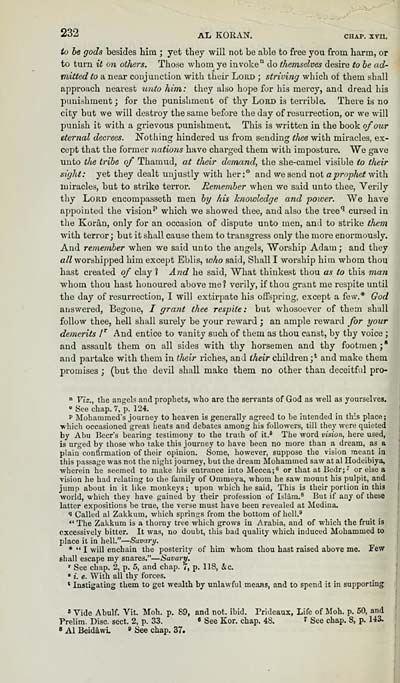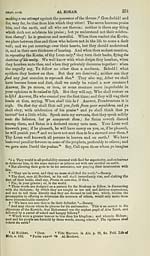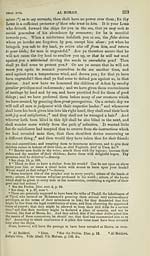Download files
Complete book:
Individual page:
Thumbnail gallery: Grid view | List view

232 Ali KORAK. CHAP. xvn.
to be gods besides him ; yet they will not be able to free you from harm, or
to turn it on others. Those whom ye invoke" do themselves desire to be ad-
mitted to a near conjunction with theu* Lord ; striving which of them shall
approach nearest unto him: they also hope for his mercy, and dread his
punishment; for the punishment of thy Lord is terrible. There is no
city but we will destroy the same before the day of resurrection, or we will
punish it with a grievous punishment. This is written in the book of our
eternal decrees. Nothing hindered us from sending thee with miracles, ex-
cept that the former natio7is have charged them with imposture. We gave
unto the tribe of Thamud, at their demand, the she-camel visible to their
sight: yet they dealt unjustly with her :° and we send not a prophet with
miracles, but to strike terror. Remember when we said unto thee. Verily
thy Lord encompasseth men by his knowledge and power. We have
appointed the vision^ whicli we showed thee, and also the tree*^ cursed in
the Koran, only for an occasion of disi^ute unto men, and to strike them
with terror; but it shall cause them to transgress only the more enormously.
And remember when we said unto the angels, Worship Adam; and they
all worshipped him except Eblis, who said, Shall I worship him whom thou
hast created of clay ] A?id he said, What thinkest thou as to this man
whom thou hast honoured above me? verily, if thou grant me respite until
the day of resurrection, I will extirpate his offspring, except a few.* God
answered. Begone, / grant thee respite: but whosoever of them shall
follow thee, hell shall surely be your reward ; an ample reward for your
demerits /' And entice to vanity such of them as thou canst, by thy voice ;
and assault them on all sides with thy horsemen and thy footmen;'
and partake with them in tlieir riches, and their children;* and make them
promises ; (but the devil shall make them no other than deceitful pro-
" Viz., the angels and prophets, who are the servants of God as well as yourselves.
• See chap. 7, p. 124.
p Mohammed's journey to heaven is generally agreed to be intended in this place;
which occasioned great heats and debates among his followers, till they were quieted
by Abu Beer's bearing testimony to the truih of it.* The word vision, here used,
is urged by those who take this journey to have been no more than a dream, as a
plain confirmation of their opinion. Some, however, suppose the vision meant la
this passage was not the night journey, but the dream Mohammed saw at al Hodeibiya,
wherein he seemed to make his entrance into Mecca;^ or that at Bcdr;^ or else a
vision he had relating to the family of Ommeya, whom he saw mount his pulpit, and
jump about in it like monkeys; upon which he said, This is their portion in this
world, which they have gained by their profession of Islam.® But if any of these
latter expositions be true, the verse must have been revealed at Medina.
1 Called al Zakkum, wliich springs from the bottom of hell.*
" The Zakkum is a thorny tree which grows in Arabia, and of which the fruit is
excessively bitter. It was, no doubt, this bad quality which induced Mohammed to
place it in hell." — Savary.
• " I will enchain the posterity of him whom thou hast raised above me. Few
shall escape my snares." — Savary,
■' See chap. 2, p. 5, and chap. 7, p. 118, &c.
' 1. e. With all thy forces.
• Instigating them to get wealth by unlawful meaBS, and to spend it in supporting
» Vide Abulf. Vit. Moh. p. 89, and not. ibid, Prideaux, Life of Moh. p. 50, and
Prelim. Disc. sect. 2, p. 33. « See Kor. chap. 48. ^ See chap. 8, p. 143.
8 Al BeidawL » See chap. 37.
to be gods besides him ; yet they will not be able to free you from harm, or
to turn it on others. Those whom ye invoke" do themselves desire to be ad-
mitted to a near conjunction with theu* Lord ; striving which of them shall
approach nearest unto him: they also hope for his mercy, and dread his
punishment; for the punishment of thy Lord is terrible. There is no
city but we will destroy the same before the day of resurrection, or we will
punish it with a grievous punishment. This is written in the book of our
eternal decrees. Nothing hindered us from sending thee with miracles, ex-
cept that the former natio7is have charged them with imposture. We gave
unto the tribe of Thamud, at their demand, the she-camel visible to their
sight: yet they dealt unjustly with her :° and we send not a prophet with
miracles, but to strike terror. Remember when we said unto thee. Verily
thy Lord encompasseth men by his knowledge and power. We have
appointed the vision^ whicli we showed thee, and also the tree*^ cursed in
the Koran, only for an occasion of disi^ute unto men, and to strike them
with terror; but it shall cause them to transgress only the more enormously.
And remember when we said unto the angels, Worship Adam; and they
all worshipped him except Eblis, who said, Shall I worship him whom thou
hast created of clay ] A?id he said, What thinkest thou as to this man
whom thou hast honoured above me? verily, if thou grant me respite until
the day of resurrection, I will extirpate his offspring, except a few.* God
answered. Begone, / grant thee respite: but whosoever of them shall
follow thee, hell shall surely be your reward ; an ample reward for your
demerits /' And entice to vanity such of them as thou canst, by thy voice ;
and assault them on all sides with thy horsemen and thy footmen;'
and partake with them in tlieir riches, and their children;* and make them
promises ; (but the devil shall make them no other than deceitful pro-
" Viz., the angels and prophets, who are the servants of God as well as yourselves.
• See chap. 7, p. 124.
p Mohammed's journey to heaven is generally agreed to be intended in this place;
which occasioned great heats and debates among his followers, till they were quieted
by Abu Beer's bearing testimony to the truih of it.* The word vision, here used,
is urged by those who take this journey to have been no more than a dream, as a
plain confirmation of their opinion. Some, however, suppose the vision meant la
this passage was not the night journey, but the dream Mohammed saw at al Hodeibiya,
wherein he seemed to make his entrance into Mecca;^ or that at Bcdr;^ or else a
vision he had relating to the family of Ommeya, whom he saw mount his pulpit, and
jump about in it like monkeys; upon which he said, This is their portion in this
world, which they have gained by their profession of Islam.® But if any of these
latter expositions be true, the verse must have been revealed at Medina.
1 Called al Zakkum, wliich springs from the bottom of hell.*
" The Zakkum is a thorny tree which grows in Arabia, and of which the fruit is
excessively bitter. It was, no doubt, this bad quality which induced Mohammed to
place it in hell." — Savary.
• " I will enchain the posterity of him whom thou hast raised above me. Few
shall escape my snares." — Savary,
■' See chap. 2, p. 5, and chap. 7, p. 118, &c.
' 1. e. With all thy forces.
• Instigating them to get wealth by unlawful meaBS, and to spend it in supporting
» Vide Abulf. Vit. Moh. p. 89, and not. ibid, Prideaux, Life of Moh. p. 50, and
Prelim. Disc. sect. 2, p. 33. « See Kor. chap. 48. ^ See chap. 8, p. 143.
8 Al BeidawL » See chap. 37.
Set display mode to: Large image | Transcription
Images and transcriptions on this page, including medium image downloads, may be used under the Creative Commons Attribution 4.0 International Licence unless otherwise stated. ![]()
| Early Gaelic Book Collections > J. F. Campbell Collection > Koran: or, Alcoran of Mohammed > (386) |
|---|
| Permanent URL | https://digital.nls.uk/77138341 |
|---|
| Description | Volumes from a collection of 610 books rich in Highland folklore, Ossianic literature and other Celtic subjects. Many of the books annotated by John Francis Campbell of Islay, who assembled the collection. |
|---|
| Description | Selected items from five 'Special and Named Printed Collections'. Includes books in Gaelic and other Celtic languages, works about the Gaels, their languages, literature, culture and history. |
|---|

